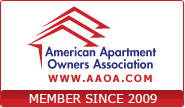Tristan is the Executive Vice President and shareholder with the law firm of Petrie+Pettit and focuses his practice in the area of landlord-tenant law representing landlords and property management companies throughout Wisconsin.
Call us: (414) 276-2850
HUD Issues New Rule On "Discriminatory Effect" a.k.a Disparate Impact
Posted by Tristan R. Pettit, Esq. in AASEW, Fair Housing / Discrimination, Legislation, Protected Classes, Screening Tenants / Comments
HUD has issued a new Fair Housing “disparate impact” rule that may cause problems for landlords during the screening process. The new rule creates a new provision entitled “Prohibiting Discriminatory Effects” which defines “discriminatory effect” as situations in which a facially neutral (i.e. not discriminatory) housing practice can become discriminatory if it actually or predictably has an effect on a group of persons that are members of a protected class.
The concern is whether or not this new rule will restrict landlord’s use of criminal background checks on prospective tenants. Recently Pepsi Co. agreed to pay $3.13 Million to resolve allegations of hiring discrimination against African-Americans based on Pepsi’s use of the African-American’s arrest records.
This recent settlement when read in conjunction with HUD’s new rule causes concern regarding whether it will be considered discriminatory to use a person’s criminal arrest or conviction as a basis for rejecting a rental applicant when such use would result in members of a protected class being rejected as tenants. For more on this issue and
In light of this concern, the AASEW’s Executive Committee submitted the following comments to HUD:
The Apartment Association of Southeastern WI, Inc. is a trade association representing approximately 575 owners and managers of rental housing in the Metro Milwaukee area.
Our organization supports Fair Housing as well as community efforts to reduce the effects of crime within the neighborhoods that our members own and manage rental housing.
We are concerned that this proposed rule will restrict the legitimate and necessary use of criminal arrest and conviction records in screening tenants to exclude those who will cause disruption and harm to other occupants, the neighborhoods those properties are located in, and to our properties.
Many communities in southeastern Wisconsin have "Nuisance Property Ordinances" that hold owners accountable for the misdeeds of their tenants. For example Milwaukee's Nuisance Ordinance does not require the conviction, nor the arrest of the tenant or their invitees, rather simply repeat law enforcement activity will trigger the enforcement provisions of that ordinance.
As part of your proposed rule property owners need "bright line" guidance, establishing what background screening criteria and methods will remain acceptable under this proposed rule as well as protections from potentially conflicting local requirements.
It would be inequitable, causing unnecessary costs and harm to property owners if such guidance is not provided in advance of the implementation and enforcement of this proposed rule.
Hopefully additional guidance will be provided. If and when it is I will be sure to provide everyone an update.




